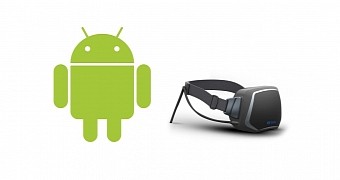Google has pretty big plans for 2015. As we told you a few days ago, the search giant recently confirmed its wireless carrier plans, albeit at a small scale.
But Google is also constantly thinking of the future of Android. Since virtual reality is the next big thing, the tech behemoth wants to be a part of the developing industry too.
Google is bringing virtual reality to Android
As a recent report coming out of the Wall Street Journal points out, Google has a team working on developing a version of its Android operating system specifically tailored to power virtual reality apps.
The internet giant has already assembled a team of tens of engineers who are dedicating their time to building a version of the operating system that can be integrated in this kind of future devices.
Two sources familiar with the matter disclosed the information and also added that Google plans to distribute this version for free, in the same fashion as it did with the old-school version of Android.
A particular timeline for when this might happen has not been announced yet and Google also failed to comment on the matter. It’s probably trying to keep things secret for the time being.
However, you should be taking this information with a grain of salt. Virtual reality devices are not yet shipping at a mass scale, but with Google meddling into things, there are high chances things will be pushed beyond game companies and filmmaking showing interest for the technology.
With rivals heavily investing into virtual reality, it makes sense for Google to follow the same pattern, in order to not be left behind.
Is Google a bit late to the VR party?
Facebook, for one, jumped ahead of the competition, after buying the headset maker Oculus VR last year for a pretty chunky $2 / €1.84 billion.
Facebook sees virtual reality as the next big thing in mobile platforms with applications possible in gaming, entertainment, communications and beyond.
Even if virtual reality devices are yet to reach mass popularity, the ecosystem is slowly getting populated. For example, Samsung has the Gear VR, Sony is developing Project Morpheus, Microsoft has the HoloLens, and so on.
Google has already started giving signs that it is interested in virtual reality. The search behemoth acquired Magic Leap, a startup focused on developing a wearable system for augmented reality. Bringing Android into the equation is the next logical step.

 14 DAY TRIAL //
14 DAY TRIAL //